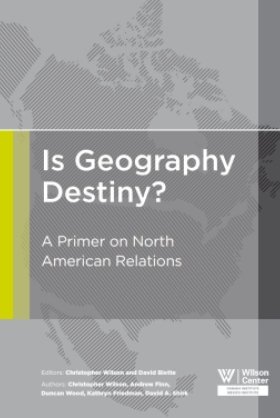Is Geography Destiny? A Primer on North American Relations



The North American Free Trade Agreement celebrates its twentieth anniversary in 2014, creating a natural opportunity to reflect on the state of North American security and competitiveness. At a time when nearly all of the key issues facing North America are being understood and addressed either independently by the United States, Canada and Mexico, or within the dual-bilateral framework of U.S.-Mexico and U.S.-Canada relations, this report attempts to view these challenges and opportunities through a trilateral lens. This shift is simple but powerful. In fact, it means that this report, which was designed to be largely descriptive, has more than a dash of policy recommendations as well. Simply by taking North America as the unit of analysis, new policy options begin to percolate.
Some highlights from the report:
In recent years, the prevailing dual-bilateral approach has both led to and been caused by a “North America when necessary, but not necessarily North America” mindset. The findings of this report suggest a simple and slight modification is needed: “North America when possible, but possibly not always North America.”
If bilateral efforts are advanced within the framework of a strategic vision for a stronger, more competitive North America, then bilateral relations take on a deeper purpose, becoming laboratories for cooperative efforts that can become best practices and, when appropriate, be trilateralized.
North American cooperation on economic issues is best understood as an enormous opportunity for development and prosperity. Cooperation on security and border management may be better understood as a necessity.
Authors


Deputy Director of the Council on State Governments--Eastern Regional Conference, New York; former Director of the Polar Initiative and former Director and Senior Advisor to the Canada Institute



Research Associate Professor of Law and Planning, University at Buffalo

Professor and Graduate Director, Department of Political Science and International Relations, University of San Diego; Director, "Justice in Mexico" Project

Mexico Institute
The Mexico Institute seeks to improve understanding, communication, and cooperation between Mexico and the United States by promoting original research, encouraging public discussion, and proposing policy options for enhancing the bilateral relationship. A binational Advisory Board, chaired by Luis Téllez and Earl Anthony Wayne, oversees the work of the Mexico Institute. Read more


Canada Institute
The mission of the Wilson Center's Canada Institute is to raise the level of knowledge of Canada in the United States, particularly within the Washington, DC policy community. Research projects, initiatives, podcasts, and publications cover contemporary Canada, US-Canadian relations, North American political economy, and Canada's global role as it intersects with US national interests. Read more




